One of the most versatile actors of his generation and any generation since, to be honest, Jean-Paul Belmondo has entertained for decades and for good reason.
He’s famous in the art house circuit by being one of the main protagonists within the French New Wave movement of the 1960’s but has also done some rather wonderful slapstick comedies as well. Somehow he has done both with such ease, always interweaving between the two and making the most of his on screen time.
A renaissance man of sorts on film, he could be having a normal conversation while battling super-spies with a telephone and doing it with a straight face the whole time, smoking a cigarette and just looking cooler than SteveMcQueen while doing it.
Yes, I just said he was cooler than Steve McQueen.
If you’re asking me who Jean Paul Belmondo is, you might be on the wrong site. Considering he is in a few of the most influential films that Criterion has put out, a few of which are on this list.
This is my top 10 essential Jean-Paul Belmondo films.
I do love writing out his name.
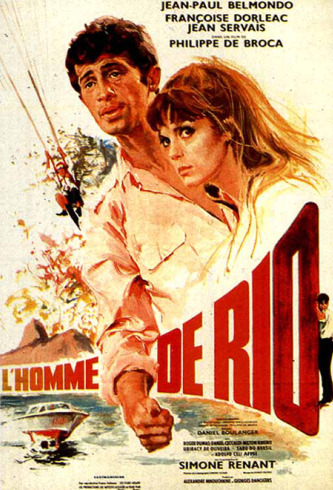
10. L’Homme De Rio (1964)
Or as it’s known here, That Man From Rio. What a wonderful adventure film starring Jean Paul Belmondo and Françoise Dorléac (sister to Catherine Denevue). A funny film that has some great set pieces and just the charisma of these two that make it stand the test of time. Just the scenery in Rio De Janeiro alone is worth seeking this out. That and the scene I’ve enclosed below. A sad note though, Françoise Dorléac died only 3 years later from a car accident at the age of 25. Luckily we’ll always have her few films to cherish forever.
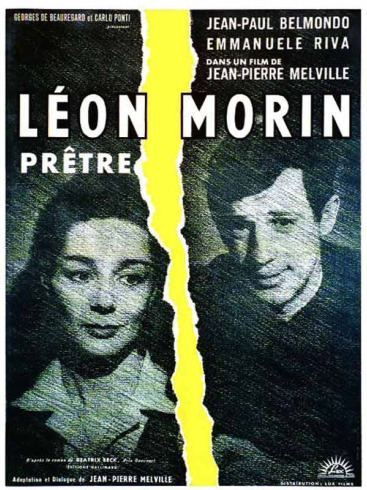
9. Léon Morin, prêtre (1961)
Or as it’s known in America, Léon Morin, Priest. Nominated for a BAFTA Award for Best Actor that year for this role, Belmondo stars as the cool, handsome priest who meets Emmanuelle Riva’s Barny when she randomly chooses a church to go into and confess all her past wrongdoings. Mind you, she is a communist militant who is also a widow and has a daughter and feels that the easiest way is the best way.
The film is amazing in how it shows why these two from completely different worlds become close, she being impressed by his strength in a world so horrible and he using it as his mission to steer her into the right direction in life. Did I mention it’s also during the Nazi occupation? Seek this film out now if you know what’s good for you.
8. Classe tous risques (1960)
Or as it’s known in America, Consider All Risks (and in the UK as The Big Risk). One of Belmondo’s first films (this was the same year as another film that’s on my list… but more on that later). A gangster film by Claude Sautet, in black and white and it’s a French and Italian co-production? I’m in!
When I first saw this film a few years back, I fell in love with the cinematography by Ghislain Cloquet (look him up… his work on Balthazar alone is proof of his brilliance). A simple story, really, about a French mobster who is trying to make his way from Italy through Paris and is being pursued by the police and his only refuge is a man named Davos, played by Belmondo. Just a fantastic little film that for some reason is all but forgotten now.
7. Le Doulos (1962)
Or as it’s known in America, The Finger Man. Luckily it’s known by it’s French title on DVD releases. It’s a film by Jean-Pierre Melville, 5 years before his first masterpiece Le Samourai and 8 years before Le Circle Rouge. It uses a narrative that switches back and forth between two different anti-heroes, Maurice and Silien. It makes the viewer grasp for one specific narrative, which gives it a magical realism to it all.
In someone’s eyes, it could have been a normal crime film, but Melville uses staples of the gangster film, trench coats and hats, and is set in a world that every man is in this sort of garb, so we as the viewer almost gets confused as to which character is which. I love this film so much and the whole loyalty amongst men theme and where friendship is truly tested. A great film and one of Melville’s films that people don’t mention when speaking about him.
6. Le Professionnel (1981)
Or as it’s know in America… well, I think you should know the name. Belmondo plays French Secret Agent Josselin Beaumont and he’s sent to a fictional African nation (Malagawai) and is ordered to kill their dictator, Colonel Njala. Of course he’s turned on by his own secret service and is injected with drugs and imprisoned unjustly. He then vows revenge on his betrayers and Colonel Njala himself. A great little action flick, just in the grand tradition of foreign espionage and revenge. I tend to always gravitate toward these films. It also has an amazing Ennio Morricone soundtrack. Check it out as fast as you can.
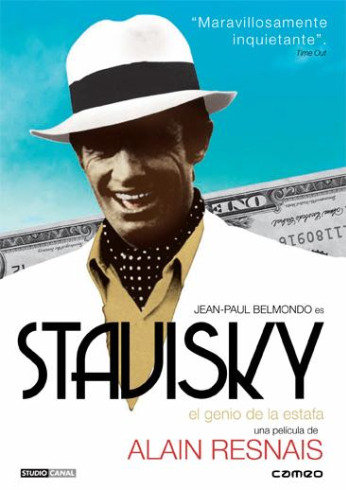
5. Stavisky (1974)
A French film by Alain Resnais, it’s based on the true story of the 1934 political scandal known as the Stavisky Affair and led to the resignation of 2 prime ministers, a fatal riot and a reform of the government itself. Belmondo of course plays the title role of Alexandre Stavisky, the flamboyant embezzler that started this spiral of the French government. It actually only deals with about a year in time of his life, from late 1933 to the year in question.
We do get flashbacks throughout, showcasing his arrest as a petty crook in 1926 and his father killing himself because of this dishonor) and flash forwards to later in his life (his parliamentary enquiry into the Stavisky affair and even his own funeral). Belmondo actually commessioned the screenwriter Jorge Semprún to write a movie about Stavisky and we as the film viewer is blessed to have such a fantastic period piece and a history that not many people outside of France are that familiar with.
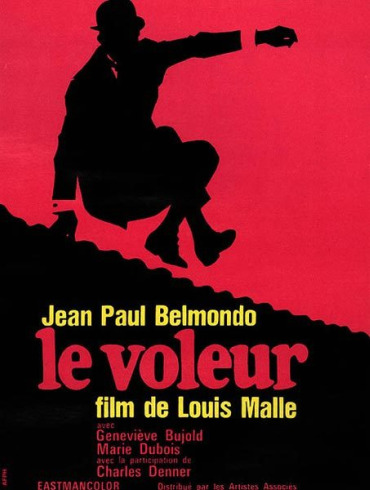
4. Le voleur (1967)
Or as it’s known in America, The Thief of Paris. One of my favorite Louis Malle films, let alone in my top 5 films of Belmondo mania. He plays charismatic professional thief Georges Randal at the turn of the century in the city of Paris. We get to witness in true fashion his amazing burglaries and also the relationship between himself and his cousin Charlotte (played by the beautiful Geneviève Bujold).
There of course is a reason as to why he gets into the world of thievery. His uncle squanders his inheritance and Georges likes to live the good life and therefore must steal in order to keep it up. Just a fun film that showcases Belmondo’s talent for saying so much without uttering a word.
3. Pierrot le fou (1965)
It translates to ‘Pete The Madman’ but has never been released under any other name but Pierrot le fou. What other film would have Sam Fuller himself as “American Director” during a party scene? One of Jean-Luc Godard’s finest films, it stars Belmondo as Ferdinand Griffon, who isn’t happy about his marriage so he leaves this boring life of a wife and child after he’s been fired by his job and runs off with the baby sitter.
But as opposed to most stories that would just leave it at that, they are also running away from Algerian gangsters, go on a crime spree throughout Paris and most of the Mediterranean Sea. He then starts to regret this chosen lifestyle on the run and ends up reading lots of books and writing in a diary and philosophizing about life itself. Marianne (baby sitter) becomes bored with his chosen settled down lifestyle and they meet up with one of their pursuers.
I might be giving away too much, so I’ll stop it there. It’s got to be seen to be believed and now that Criterion put it out on Blu-Ray, there’s no other way to see the film. The vivid colour it was shot in, using striking primary colors, has never looked better. Godard, famous for not having a script for a film until a few days before the first day of shooting, didn’t change that method and made sure to have some of it done the day before and then had his actors improvise most of the scenes. Also the actors break the fourth wall a lot and it plays with the audience throughout. It’s a motion picture version of the pop art movement and you need to check it out on Blu-Ray or stream it on Netflix now.
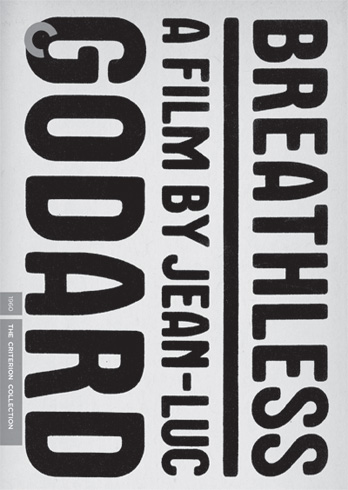
2. À bout de souffle (1960)
Or as it’s famously known as in America, Breathless. This is the film that made Jean-Paul Belmondo a household name and one of three films that brought the French New Wave to the forefront. Michel (Belmondo) is a young tough guy who thinks of himself as Humphrey Bogart and tries to be like him in every day life. The problem with that is that he steals a car and then shoots a cop who has chased after him. Now he hasn’t a dollar to his name and is on the run from the police, he has no other choice than to turn to Patricia (Jean Sedberg), his American girlfriend, and she hides him, not knowing the full extent as to why he is in hiding.
Throughout the film he tries to seduce her and tries to get a loan from Italy to make their escape easier. She is finally told, by the police themselves, why he’s on the run and she turns on him but makes sure to tell him. At first he’s okay with it and the idea of prison but then tries to escape and in one of the greatest climaxes ever in a film, the police catch up to him and… well, watch the film and see why it’s one of my favorites.
This was Jean-Luc Godard’s first foray into directing a feature film and was written by Godard and François Truffaut. People take for granted the ‘jump cut’ now, but this film was the first to use it in such new and amazing ways that slammed everyone on their asses and showed that film making was changing for the better. Godard also wanted the film to look like a documentary so he asked Raoul Coutard to shoot on on a handheld camera and no extra lighting, just whatever natural lighting was around. The only problem with that was the camera was a bit too loud, so the entire film had to be dubbed. Yet, because it’s so brilliant, you don’t even notice. One of the greats in cinematic history.
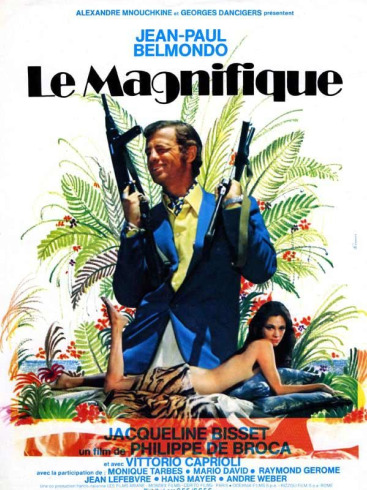
1. Le Magnifique (1973)
It translates simply as ‘The Magnificent’ and to me, it’s the best film that showcases Belmondo’s talents overall. Modeled a bit after the author of the OSS 117 novels, Jean Bruce, it’s a satire of pulp novels and James Bond films themselves and most people are thrown for a loop when the film changes from one perspective to an entirely new one about 40 minutes in. Which I think is brilliant.
I didn’t get to see this film until Butt-Numb-A-Thon 11 and it absolutely blew me away. It looked beautiful and was such a hysterical piece of cinema that I knew I had to own this film somehow. Sadly it is out of print but it hasn’t detered me. The film deals with François Merlin and him writing his 43rd novel about his character, Bob ‘Sinclair’. But where it differs from other films about writers, we see it through his imagination where he is also Bob and this is his outlet to get away with his aspirations and dreams themselves.
Jacqueline Bisset plays a sociology student Christine, who becomes enamored with François and then reads all 42 of his novels. In François’ book, she becomes Tatiana, his new lover and equal in that world while his publisherd doubles as the villain Karpof/Charron. Just a fantastic film, showing how someone could be fascinated with a fictional character and not notice the actual author himself, who might not be as charming and handsome as his own character. Yet he’s technically the same guy. And to see Belmondo juggle the roles so fluidly tends to amaze most people that see this film. And I’m one of its fans now and will continue to spread the word. All I ask now is that the Criterion Collection put this under-seen classic on DVD and Blu-Ray and make us all better people for seeing it with much more ease.


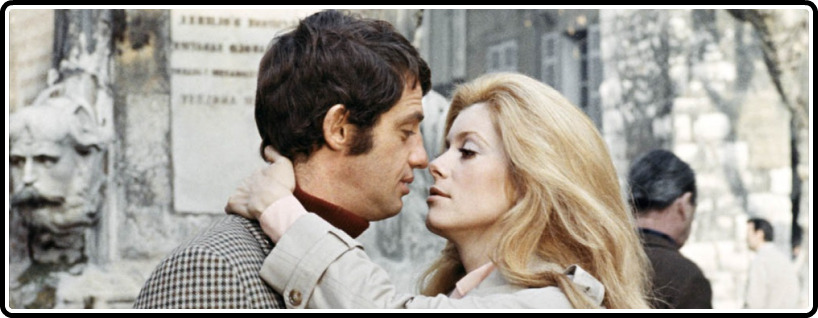


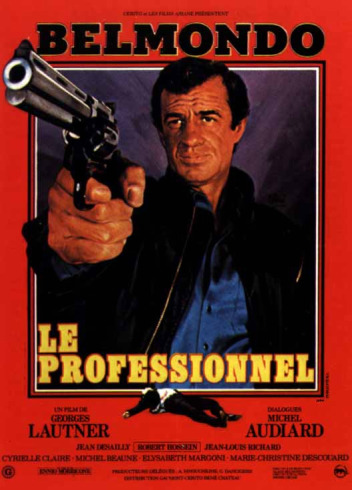


i love
Belmondo and Deleon the 2 are the best but now no one like theme in france now and what about
Jean Paul Belmondo 1971 Le Casse it has bast car chase in cinema
Jean Paul Belmondo is great